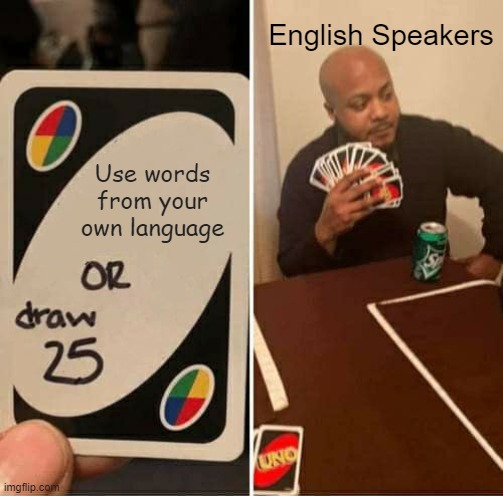“Languages and dialects…do not exist inside of a vacuum,” note linguists Hans Heinrich Hoch and Brian Joseph (Hoch and Joseph, 2009). Throughout all human history, languages have influenced and impacted one another in a series of gentle encounters and violent collisions, leading to some truly complex and truly bizarre linguistic phenomena. Some of these phenomena involve the “borrowing” or “loaning” of a word from one language into another, either perfectly translated or slightly modified to change pronunciation, meaning, or connotation of the word(s). Many words that you use everyday are, likely, not English at all (or, at least, were something very different before they were English).

“Borrowed” or “loan”-words are words that have been adopted from one language (the donor language) into another language (the receiver language) without translation (Durkin, 2014). Karma, for example, is a Hindi word without a clear English counterpart. As such, English-speakers simply “borrowed” the word for use without translation. Loan-words are extremely common in almost every language on Earth—and show how much languages influence and build one another. When two speakers of two different languages encounter one another, something they communicate new concepts, terms, or ideas to one another, which become adopted or “borrowed” into one another’s language. These words are often, then, put through the internal rules of either language, changing its pronunciation, meaning, grammatical usage, or connotation.
Mind you, loan-words are different from cognates or calques, which are similarly words that travel across multiple languages, but in different ways. Cognates are words in two or more languages that are similar because they share the same etymological root—meaning, the same words from an ancient parent language eventually developed into the two similar words in two different languages (Crystal, 2011). The English word “night” and the German word “Nacht,” for example, both come from the etymological root “nókʷts,” originally a Proto-Indo-European term. The words sound similar, but neither was borrowed directly from the other.
| Cognate Table (Proto-Indo-European Languages) | |
|---|---|
| nókʷts | |
| English | night |
| German | Nacht |
| Scots | nicht |
| Icelandic | nott |
| Sanskrit | nakt |
| Bengali | nishi |

Calques are words translated entirely with intact meaning from the donor language, usually described as “word-for-word” translation (Crystal, 2011). These can create many phrases of terms for things that originated in other languages, but eventually become so adopted into the receiver language that its original origin is lost to most speakers. A very common example of a calque is “Long time, no see,” which originates as a direct translation of the Mandarin, “好久不見 / hǎo jiǔ bù jiàn.”
| Calque Origins | Calqued Phrases |
|---|---|
| marché aux puces (French) | flea-market (English) |
| Flammenwerfer (German) | flamethrower (English) |
| el momento de la verdad (Spanish) | the moment of truth (English) |
| high school (English) | escuela alta (Spanish) |
| Adam’s apple (English) | manzana de Adán (Spanish) |
| skyscraper (English) | Wolkenkratzer (German) |
Sometimes phenomena such as these are called lexical borrowings, which refer to the borrowing on more than one word—or entire phrases—from the donor language. Déjà vu is a common example of a lexical borrowing, and one that most English speakers are familiar with. Due to their length and complexity, lexical borrowings are rarer than loan-words, but aren’t at all uncommon. Some words make an even more complicated journey through languages, with some undergoing a process called reborrowing—where a word is adopted by a receiver language from a donor language and then adopted back (with modifications) by that same donor language (Crystal, 2011). The English term “anime” underwent such a process, beginning as the English word “animation,” before being adopted into Japanese as the word “アニメ / a-ni-me.” Once re-borrowed into English, the word “anime” evolved from the Japanese pronunciation and came to specify Japanese animation itself.

By Maddy Lee
Works Cited:
Crystal, D. (2011). A dictionary of linguistics and phonetics (Vol. 30). John Wiley & Sons.
Durkin, P. (2014). Borrowed words: A history of loanwords in English. Oxford University Press.
Hock, Hans Henrich; Joseph., Brian D. (2009). “Lexical Borrowing”. Language History, Language Change, and Language Relationship: An Introduction to Historical and Comparative Linguistics (2nd ed.). Berlin: Mouton de Gruyter. pp. 241–78.
